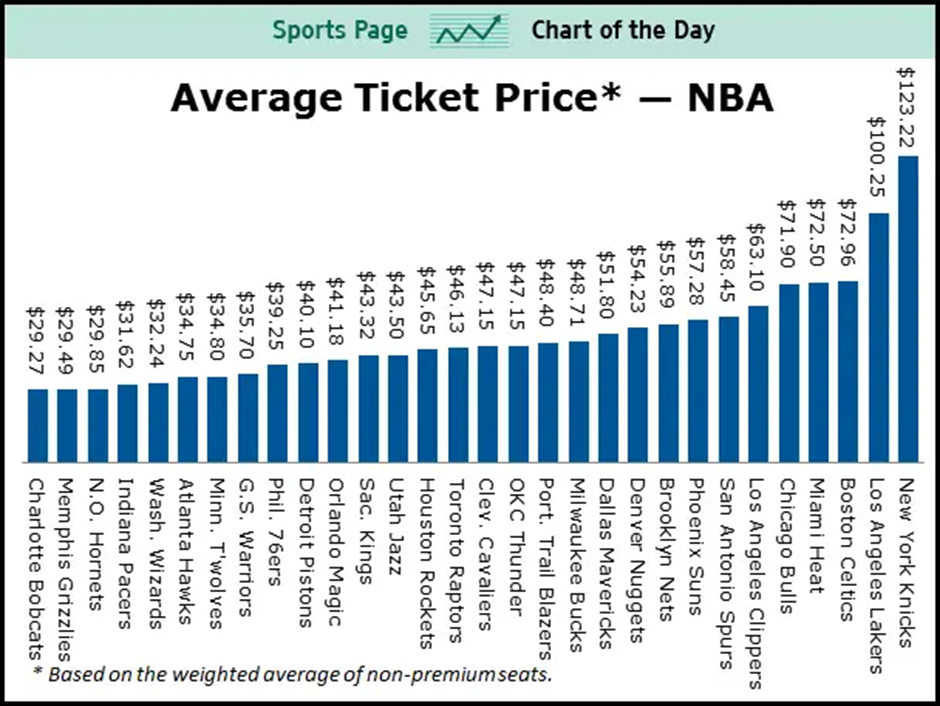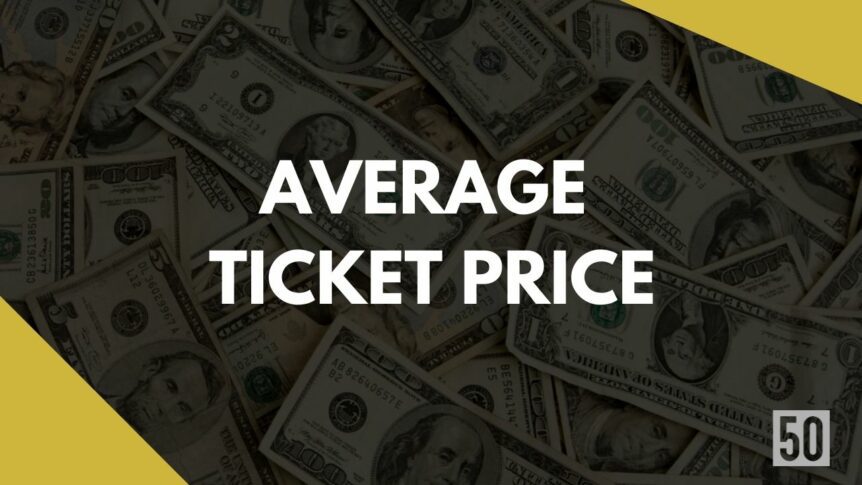If you’re a startup founder, you know that the cost of getting customers is one of your most important considerations. But do you really understand why it matters? Knowing your average ticket price (ATP) can help you figure out the real value of acquiring customers and determine if your efforts are actually leading to success.
In this blog post, we’ll look at what ATP is and how it affects startups when to measure changes in ATP customer acquisition strategies, and tips for optimizing customer spending with data-driven insights. Read on to learn how understanding and measuring ATP can be the key to unlocking valuable growth potential for your startup!
What is the Average Ticket Price?
Startups need to be aware of the average ticket price, which is an important metric in determining a business’s overall success and financial health. The average ticket price (or ATP) is the average amount that customers spend on each purchase within a given period. This figure can give startups valuable insight into customer spending habits, allowing them to target their products and services better.
This metric is especially useful for startups just beginning their operations as it helps them set realistic pricing strategies and gauge customer response to those prices. By understanding the average ticket price of customers, a business can also plan its inventory and set prices accordingly.
Why Is It Important For Startups To track the Average Ticket Price?
Following are the reasons why tracking average ticket prices is important for startups:
1. To understand the impact of marketing campaigns:
Tracking average ticket prices can help startups understand the impact their marketing campaigns are having on the pricing of their products and services. This data can optimize future campaigns and ensure they reach the right audiences at the right prices.
2. Monitor Customer Satisfaction:
By understanding how much customers are willing to pay for certain products or services, startups can ensure they are providing the highest quality and value. This data can also help them refine their product lines to maintain customer satisfaction while keeping prices competitive.
3. To Stay Competitive:
Knowing average ticket prices helps startups stay competitive with other businesses in their industry. By understanding what the market is charging for similar products, startups can adjust their prices accordingly to remain competitive.
4. To Make Accurate Forecasts:
Tracking average ticket prices helps startups better plan and forecast future expenses by understanding what customers are willing to pay for certain products or services. This data can be used to effectively plan budgets and marketing campaigns that will help the business reach its goals.
Overall, tracking the average ticket price is important for startups to understand how much customers are willing to pay for their products or services and ensure they are providing the best value for their customers. By understanding this data, startups can optimize their pricing strategies and stay competitive.
How To Calculate the Average Ticket Price?
The formula for calculating the Average Ticket Price is as follows:
Total Revenue Earned / Number of Tickets Sold = Average Ticket Price
For example, if your business has earned $3,000 in revenue from selling 20 tickets, the average ticket price would be:$3,000 / 20 = $150.
This means that the average amount of money you make for each ticket sold is $150.
What factors affect the Average Ticket Price?
The following factors affect the Average Ticket Price:
1. Demand:
Generally, the higher the demand for a product or service, the more it will cost. Startups should assess their target market and develop pricing strategies accordingly, to maximize profits and minimize lost sales.
2. Supply & Availability:
The availability of resources affects the costs associated with producing a good or service, which will affect the end price. Startups should ensure they have reliable suppliers and partners to keep their costs low.
3. Quality:
Higher quality goods and services come at a higher cost, which can impact average ticket prices. Startups should assess the value of their offerings against their competitors and factor in any additional costs associated with offering higher-quality goods or services.
4. Competition:
The competitive landscape can have a significant effect on pricing, as startups must balance their prices against those of rivals in order to remain attractive to customers. Startups should assess the market and adjust their prices accordingly to remain competitive.
5. Value Perception & Price Sensitivity:
Customers have different levels of price sensitivity and will have their own perceptions of value. Startups should consider these when setting prices, to ensure they’re not overcharging customers or undercutting themselves by selling too cheaply.
6. Seasonality:
Certain products and services may be more in demand during certain times of the year, resulting in higher average ticket prices. Startups should be aware of this and adjust their pricing accordingly, to maximize profits during peak seasons.
7. Geography:
Prices may vary between regions, due to different living costs or taxation levels. Startups should assess their target markets and factor in any regional differences when setting prices for goods and services.
In conclusion, startups should be mindful of these factors when setting prices for their products and services, to ensure they remain competitive and profitable. By understanding each factor’s impact on pricing, startups can create an effective pricing strategy that meets customer needs while still generating a healthy profit.
What is a good ticket price?
A good average ticket price metric depends on your business goals and objectives. Generally, an average ticket price should reflect the cost of goods or services being offered as well as reflect any costs associated with providing these products or services.
A higher average ticket price could indicate that customers are willing to pay a premium for higher-quality products. In comparison, a lower average ticket price could indicate that customers are looking for a bargain.
Additionally, the average ticket price should also be evaluated in comparison to competitors within the same industry or geographic area. This will help ensure your business remains competitive and profitable in the long term.
What is an example of an Average Ticket Price?
For instance, The average price for a non-premium seat in the NBA is $50.99, but 19 of the league’s 30 teams have lower prices than that. The New York Knicks have the most expensive tickets at an average of $123.22, followed by the Los Angeles Lakers ($100.25). Data from FanCostExperience.com reveals that the Brooklyn Nets saw the greatest increase in ticket prices, up 50.8% to $55.89 per seat. Three other teams (Clippers 15.1%, Rockets 11.3%, Timberwolves 10.5%) also had an increase of at least 10%. Meanwhile, eight teams experienced a decrease in their average price, with the Kings leading the way with a 10.1% drop.

Tips to Improve Average Ticket Price:
Following are the tips that could help startups improve average ticket prices:
1. Increase value-added services:
Startups can add more value to their products or services by providing additional features like free trials, discounts on other products, special offers, and a wide range of payment options. This will help customers feel that they are getting more value for the money they spend on these items.
2. Leverage customer segmentation:
Startups should start segmenting their customers according to a variety of criteria, such as geographic location, profession, age, etc. This will help them customize their offerings in line with the needs and preferences of each customer segment. It will also enable them to offer different pricing plans based on these segments.
3. Upsell and cross-sell:
Startups should focus on upselling and cross-selling their products or services. This means that they need to identify related products or services that could be of interest to customers, and then offer them discounted packages or special offers.
4. Improve customer service:
Improving customer service is another way to increase the average ticket price. Startups should strive to provide great customer service, from replying to queries and complaints in a timely manner to offer helpful advice. This will make customers more likely to purchase products or services from the startup at higher prices.
5. Introduce referral programs:
Referral programs are another effective way to attract more customers and increase average ticket prices. Startups should encourage their existing customers to refer new customers by offering rewards or discounts. This will help the startup gain more visibility and attract potential buyers who are likely to spend more money on the startup’s offerings.
6. Make use of dynamic pricing:
Startups can also use dynamic pricing to adjust prices based on market conditions. This will help them boost their profits by charging higher prices when demand is high and lower prices when demand is low.
7. Offer subscription-based models:
With the growing popularity of subscription-based models, startups should also consider offering their products or services as part of a monthly or annual recurring payment plan. This will help them increase their average ticket price, as customers will be more likely to purchase more products or services over the long term.
8. Invest in marketing:
Investing in effective and targeted marketing campaigns is another way to increase the average ticket price. Startups should focus their efforts on attracting potential customers who are likely to spend more money on their offerings. This can be done through social media campaigns, email campaigns, search engine optimization, and more.
By following these tips, startups can easily increase their average ticket price, which will in turn lead to better profits. It’s important to remember that any business’s success depends on maximizing profits by offering products and services at the right price.
The Bottom Line
In order to make sure your business is sustainable in the long run, it is essential to take a closer look at your average ticket price. By understanding your customer’s buying habits and what they are willing to pay for your product or service, you can stay ahead of the competition and make sure that your startup is on the path to success.
Use these tips to start crunching the numbers and see how you can increase your average ticket price today!

